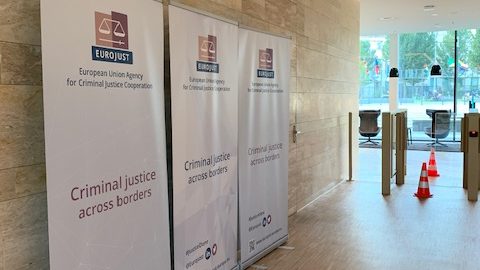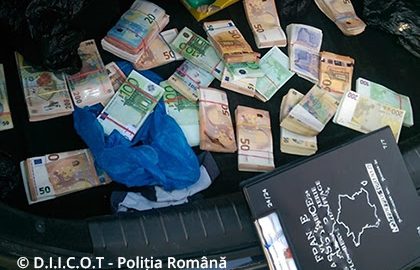Ladislav Hamran, President of Eurojust.
The one hundred joint action days coordinated at Eurojust since 2011 have led to 1 722 arrests by national judicial and law enforcement authorities.
In total during this period, 3 355 searches were carried out and more than EUR 210 million in cash, luxury cars and jewellery were seized. The actions have halted serious criminal organisations, which had struck more than 2 400 victims, and had a direct financial impact of nearly EUR 2 billion.
This detailed calculation was made after the recent conclusion of Eurojust’s 100th action day. For the past eight years, Eurojust has offered the possibility for authorities to use a purpose-built coordination centre during joint action days. Simultaneous and minutely planned arrests, searches, interviews of suspects and witnesses, seizures of evidence and the freezing of assets in real time across several countries can be carried out.
The figure on the financial impact is expected to rise, as ongoing investigations will lead to an increase in total damages, such as to tax offices in fraud cases, caused by organised crime groups. The financial impact figure also includes the estimated street value of seized illicit drugs. Coordination centres provide one of the ways that Eurojust can support Member States. In 2018 alone, Eurojust handled more than 6 500 cases.
VIDEO – Coordination centres in practice: Operation Webmaster

Eurojust’s President, Mr Ladislav Hamran, said: ‘With cross-border crime unfortunately on the rise, Eurojust is asked to assist more and more in large and complex cases. This situation leads to an increase in international actions by the judiciary, which we must coordinate in real time. By setting up a coordination centre at Eurojust, we can help immediately and ensure actions are taken at the same time and that they benefit the judiciary and police in all participating countries, whereas individual actions by Member States and third States would yield less impressive results. We will continue with these coordination centres, whenever necessary, to help our partners.’

The first coordination centre was held at the initiative of the French Desk at Eurojust in 2011, concerning the smuggling of irregular migrants by a criminal network active in six countries. Since then, coordination centres/action days have developed into a unique tool to support large-scale operations targeting cross-border crime.
A key success factor in these actions is the prompt involvement of the responsible judicial authorities to allow law enforcement officers in the field and other authorities to execute measures immediately and simultaneously in several countries. Eurojust coordination centres help prevent and solve judicial issues and ensure the timely exchange of information and coordination of all actors involved, including investigative judges, prosecutors and law enforcement authorities.

During the action day, coordination centre participants have access to dedicated and secure lines of communication. Based on the information received from authorities, the coordination centre regularly communicates the updated state of play of the execution of measures. This information helps the responsible authorities to adapt their strategies on the spot in a flexible manner to suit developments. For example, an additional European Investigation Order might be required to search an address that has only been revealed during the action. Participants must be prepared for the unforeseen and be able to react swiftly.
Due to the growing complexity of the cases referred to Eurojust, external participants are regularly invited to attend Eurojust coordination centres (e.g. in the field of VAT fraud, cybercrime, terrorism and organised crime). Judicial authorities from the involved countries play a crucial role by quickly advising on the use of judicial cooperation instruments and can use them in real time. Experts in information technology and finance assist in cases requiring their specialised expertise.
The level of dedication and mutual trust demonstrated by all participants during Eurojust coordination centres are the factors that make them such a success. Enriched with 100 action days and eight years of experience, the tool will continue to evolve and ensure justice is done in the European Union.

2011 – 2019
Some highlights of successful coordination centres
- Migrant smuggling; drug trafficking (2011): the first Eurojust coordination centre involved both crime types. Vietnamese and Kurdish migrants smuggled into Europe by a sophisticated organised criminal network active in six Member States. Thirty-eight immigrants intercepted, and thirty-five suspects arrested. In addition, two thousand cannabis plants confiscated.
- Migrant smuggling (2012): organised crime group of Afghan, Kurdish and Lithuanian origin involved in facilitation of approximately 160 Afghan migrants per week, with an estimated profit of EUR 18 million. Six suspects arrested, including the alleged mastermind, considered one of the most prolific facilitators of illegal immigration in Europe.
- Cybercrime (2014): huge operation against an organised crime group developing and selling malicious software (BlackShades) to take over and control computer operations and perform distributed denial of service cyber-attacks. Action day resulted in 97 arrests, almost 360 house searches, and more than 1 100 data storage devices seized.
- Terrorism (2015): Eurojust’s first coordination centre in a terrorism case, involving Italy, Norway and the UK. Thirteen radical Islamist leaders and members of Rawti Shax, a Kurdish-Sunni terrorist organisation rooted in 11 countries in Europe and the Middle East and affiliated with Al-Qaeda, arrested. Searches revealing valuable evidence carried out simultaneously in six countries. Eurojust analysed information, organised coordination meetings, and assisted in preparations for action day, ensuring that legal and technical requirements for execution of procedures satisfied.
- Environmental crime (2015): 4 700 horses deemed unfit for human consumption, with falsified passports, were slaughtered and entered the legal food chain in seven countries over three years. Eurojust held two coordination meetings and funded a joint investigation team involving three countries. As a result of the action day, 26 suspects arrested, 200 horses examined by veterinary services, dozens of searches carried out and more than 800 horse passports seized.
- THB (2015): young Romanian women trafficked into France for sexual exploitation. Estimated profits of more than EUR 4 million. Twenty-five suspects arrested, and 56 premises searched.
- Financial fraud (2015, 2016 and 2017): Operation Vertigo was a carousel fraud case spread over many countries, defrauding EU citizens of approximately EUR 320 million in tax revenues. Five coordination centres were held in the course of three years.
- Weapons trafficking (2018): organised crime group active for six years in trafficking in pyrotechnic material and explosives, tax fraud and money laundering. Members shipped an estimated 1 500 kg of explosives every day to different countries via regular post. A coordinated action led to 35 arrests, more than 150 searches, the seizure of 80 tons of F4 fireworks, and the blocking of four webshops.
- Drug trafficking; organised crime (2018): Operation Pollino, the largest coordinated joint action to date against an organised criminal group (‘Ndrangheta mafia), involved in drug trafficking, money laundering, bribery and violence. After a three-year investigation in six countries, and the formation of a joint investigation team facilitated and financed by Eurojust, 4 000 kg of cocaine and hundreds of kilos of other drugs seized and 84 suspects arrested.
- Financial crime (2019): the 100th Eurojust coordination centre involved six countries investigating massive pay-TV fraud and violations of audiovisual copyright. Estimated damages EUR 2.2 million per month. Twenty-two suspects identified, and more than 200 servers taken offline in three countries.




